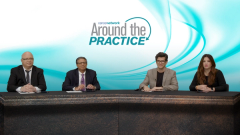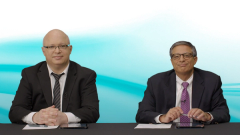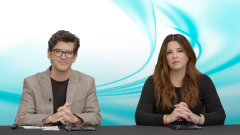
Evolving Treatment Paradigms in Relapsed/Refractory Multiple Myeloma
Join moderator Sagar Lonial, MD, FACP, and a panel of experts as they discuss recent updates in the management of relapsed and refractory multiple myeloma, exploring impact on clinical practice.
Episodes in this series

Transcript:
Sagar Lonial, MD, FACP: Welcome to this CancerNetwork® Around the Practice® program titled “Around the Practice: Evolving Treatment Paradigms in Relapsed and Refractory Multiple Myeloma.” I am your host, Dr Sagar Lonial, MD, FACP, professor and chair in the Department of Hematology and Medical Oncology at Emory University School of Medicine [in Atlanta, Georgia]. I have a great panel consisting of experts that have joined me today in this virtual discussion. I’d like to invite my colleagues to introduce themselves.
Donna Catamero, NP: I’m Donna Catamero, NP. I’m a nurse practitioner and the associate director of myeloma research at Mount Sinai Hospital in New York, [New York].
Cesar Rodriguez, MD: I’m Cesar Rodriguez. I’m the clinical director of the myeloma program at Mount Sinai in New York.
Luciano Costa, MD: And I’m Luciano Costa. I’m a myeloma physician at the University of Alabama at Birmingham.
Sagar Lonial, MD, FACP: Today we are going to cover and review recent updates in the management of relapsed and refractory multiple myeloma. And we’ll discuss these updates in the context of the treatment landscape and how they might [affect] our clinical practice. Cesar, let’s begin with some of the updates in relapsed/refractory multiple myeloma in early relapsed disease.
Cesar Rodriguez, MD: In the past year, we’ve had 3 updates in terms of early relapse. The first one I want to talk about is CANDOR, which is a clinical trial [for] patients who had 1 to 3 prior lines of therapy. And this study compared daratumumab, carfilzomib, [and] dexamethasone against carfilzomib [and] dexamethasone. The focus of the data that we have of this study was in terms of median progression-free survival [PFS], MRD [minimal residual disease] negativity, the percentage of depth of the response of these patients, and then a subset evaluation of high-risk cytogenetics.
In terms of the median progression-free survival, we see that the addition of daratumumab significantly improves the median PFS. It goes from 28 months in the daratumumab-containing arm vs 15 months. That’s almost a year that they’re gaining control of their disease. And the MRD negativity that the patients are achieving by adding the daratumumab is also significantly improved. This study also evaluated MRD negativity at 12 months, which also maintained an improvement by adding the daratumumab.
Another important update that we have this year is the IKEMA study [NCT03275285], which is isatuximab with carfilzomib and dexamethasone [compared] with carfilzomib [and] dexamethasone as well in people who had 1 to 3 prior lines of therapy. And [in] the data from IKEMA, the primary objective was progression-free survival. And the addition of the isatuximab improved the PFS by almost double: 35 months vs 19 months. So we’re seeing similar patterns with that.
And there was a subset analysis also in 1q deletion. Is there a signal in particular with 1q deletion? And they did present this year some data on whether there is an impact or a difference in the patients who have 1q deletion alone, 1q deletion in combination with other high-risk cytogenetics, or globally. And there are some differences in terms of a benefit of adding the isatuximab in the 1q gain isolated and in combination with other cytogenetics.
But when we analyze the 1q amplification, there isn’t that much benefit. That’s still a big problem. Finally, the other update that we had this year is for the ICARIA-MM study [NCT02990338], which was also isatuximab with pomalidomide [and] dexamethasone, which is showing how a monoclonal antibody does add to the PFS [and] the depth of the response in these patients. Everything is [a] nice update of trying to consolidate how anti-CD38s are here to stay and a good addition to the current therapies.
Sagar Lonial, MD, FACP: Let’s get the rest of the panel involved here. How do you all interpret some of these new updates from large, randomized phase 3 trials and use these decisions or use these data to make decisions on patients in front of you?
Luciano Costa, MD: As Cesar summarized, the message is very clear in all those trials. If you have a patient in a relapsed setting who has not been exposed to the CD38 monoclonal antibody, that is the absolute thing to do in just about everybody. It becomes a little bit more nuanced about what to combine that with. And then we tend to use general principles, including what this person’s disease is known to be refractory to, what it’s not, and usually go [with] what is not.
A very common scenario in the United States is people who are [experiencing progression] on the tail end of long exposure to lenalidomide. Then you have 2 reasonable options with the monoclonal antibody pomalidomide or the monoclonal antibody carfilzomib. We have shied away from using the monoclonal antibody bortezomib. There’s the occasional patient [for whom] you feel strong about a proteasome inhibitor but don’t want to use carfilzomib for cardiovascular concerns. You might use that regimen. But the data are clear that if you have the option, carfilzomib is a better proteasome inhibitor, particularly in the relapse setting. We tend to combine with that.
Of course, the decision between those regimens is often driven by some perception of risk. We tend to favor [a] carfilzomib-based regimen [for] a patient who has had a shorter remission or a remission that needs faster disease control and [for] issues of convenience. However, these data, as fantastic as they are, are going to become less relevant in the years to come as we’re going to see more patients [experience] relapse who have been exposed previously to a CD38 monoclonal antibody.
And we have this big gap here [so] that we apply general principles to those patients. Sometimes we repeat the monoclonal antibody, but we still don’t have, to this point, high-level data to guide us [on] how to manage those patients.
Donna Catamero, NP: My question is, [if] we are using more and more monoclonal antibodies up front, how relevant is this to patients [experiencing relapse] early on?
Sagar Lonial, MD, FACP: From our perspective, to choose the partner for a CD38 [antibody] for most patients who, when they’re [experiencing relapse], have not had a CD38, probably 90%, we make that decision on the partner based on duration of first remission. When Dr Joseph and our group look back at our data of dara/pom/dex [daratumumab/pomalidomide/dexamethasone], people with PFS of less than 36 months didn’t benefit from dara/pom/dex, and we try carfilzomib in those patients. We don’t know that it’s going to be any better.
But [for] people who had longer PFS, dara/pom/dex is easy and simple, and that tends to be our go-to, at least in our practice, and I’m curious how you [all] approach this. We only give the daratumumab for the first 4 cycles of therapy. I don’t have any hesitation using it in the context of relapsed disease because they really only see 16 doses of daratumumab in that context. They may not be as sensitive, but I don’t know that they’re resistant.
Luciano Costa, MD: I agree with you. We do that as well. People have been exposed and haven’t been on an…antibody for 6 months, a year, or longer. But the reality is a leap of faith. We still don’t know how that prior exposure will affect the disease. And the other thing is your practice is probably very much like ours. A lot of our people receive a transplant-eligible template. But now we have these people who receive DRd [daratumumab/lenalidomide/dexamethasone] as first-line therapy who are [experiencing progression] for whom we don’t have good data to guide us.
Cesar Rodriguez, MD: Yes, you’re right. We are starting to incorporate anti-CD38s up front for induction. At Mount Sinai, we do it as part of the induction, and we continue it in a lot of our patients as maintenance, but then with time we drop the monoclonal antibody. And [in] these studies, even if we are using it at maintenance, we are eventually dropping it. So by the time they’re [experiencing relapse], they’ve had a gap there from exposure. And [findings from] these 3 studies are basically confirming that triplet therapy is better than doublets. And a monoclonal antibody combination is a good option at relapse. And if you have enough gap between the previous line of therapy and the relapse, it seems like a reasonable thing to incorporate anti-CD38 agents.
Transcript is AI generated and edited for readability.
Newsletter
Stay up to date on recent advances in the multidisciplinary approach to cancer.










































